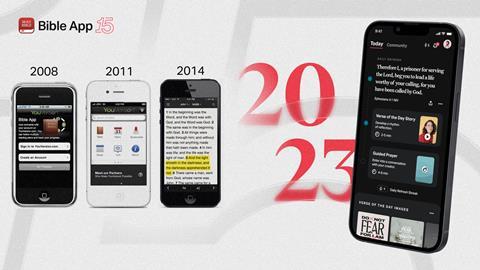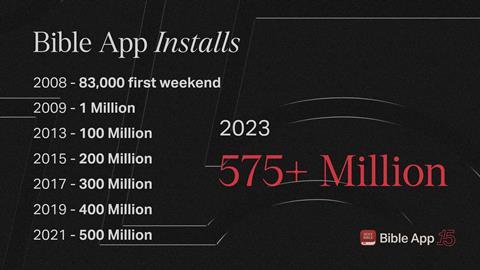As the world’s most successful Bible app turns 15, Chris Goswami chats with YouVersion’s CEO to find out how the technology is changing our discipleship

Over the past three months, I’ve dropped into services at nine churches, including Pentecostal, Baptist, CofE, Roman Catholic and Eastern Orthodox.
Not one offered me a printed Bible.
It’s not that these churches believe the scriptures are unimportant, it’s that everybody already has a Bible, on their phone. And, even if you don’t, many churches display the Bible reading on screen.
We’re so used to our Bible apps it seems surprising that, only 15 years ago, a Bible on your phone was inconceivable!
This month YouVersion is celebrating the very first Bible app, launched simultaneously with the all-new App Store back in 2008.
YouVersion’s story is one of astonishing success, but have we lost something by giving up the Bible as a book?
The YouVersion Story
I recently caught up with Bobby Gruenewald, founder and CEO of YouVersion and, make no mistake, there’s a huge amount to celebrate here. Their Bible app is available in 2,000 languages and has been downloaded more than half a billion times. Every minute of every day, the Bible App is installed 95 times and a verse is shared over 1,000 times. These are staggering numbers.
Their vision is just as startling. “We’re only at the beginning of what God wants to do with YouVersion” said Gruenewald. “By 2033, we plan to see some portion of the Bible translated into all 7,000+ spoken languages, some of which still require a written language to be developed.”
We’re only at the beginning of what God wants to do with YouVersion
Over 15 years, YouVersion’s app has evolved remarkably. Mobile Bibles now offer multiple translations (including audio versions), ability to add personal notes, and serious study guides. Readings are paired with devotionals, you can get an inspirational verse delivered to you every day, and you can even share a reading plan with a group of friends and keep one other accountable. These are wonderful innovations.
If you add to this the fact that Bible apps have proven instrumental in getting scripture into developing countries and countries where it is banned, it looks like YouVersion has this one sewn up.
But are there downsides to relying on the word of God in our pocket or handbag?

A two-edged sword
If I were to show you a map of your street you would understand it perfectly. But it wouldn’t tell you where the street is in your town. Or, crucially, that there even is a town.
Likewise, when viewing a tiny screenshot of God’s word, there is a danger of fragmentation. We can lose sight of the Bible as a book, in fact a library of books with one over-arching narrative. Where does this fragment fit into God’s big story? What came before this? These questions are easier with a print Bible where you can immediately see previous headings, or flick forward to another book while keeping a finger in this one. On a phone, these things are not intuitive. (And with scripture displayed on a big screen in church it’s impossible, you lose all context). The printed Bible communicates a message: here is a set of ancient documents gathered together, disparate yet connected.
Then there is the question of distraction. Phones are notoriously disruptive. It’s not ideal if alerts and messages are coming in while reading God’s word. Even when silenced, the mere knowledge of their presence can be distracting. Imagine praying earnestly to God, only to get interrupted by a “ping” every few seconds while God goes off to check something! I’m kidding, but sometimes we need uninterruptable time, alone, with God.
When I raise this with Gruenewald he points out there’s a flip side, where this “disruptive technology” actually helps to keep scripture top of mind. ”Apps give you the ability to do things you simply couldn’t do with a book,” he points out. “For example, sign up for reminders to interrupt your day with scripture, and engage with the Bible more consistently”.
A physical book is tactile, it’s weighty, we can hold on to it. I have a minister friend who still preaches from notes placed inside his Bible. It’s a visible sign to the congregation, an implied notion that here is a message from God. When I was discussing this topic on Premier Christian Radio with Chick Yuill earlier this year, a 26 year-old called in to say she always reads from her print Bible. “It feels more like I’m taking time out for God as I’m on my phone a lot,” she said, adding, “I also find it comforting to hold my Bible physically”.
Digital or Print?
God has always chosen new media to communicate with his people. Originally it was burning bushes, pillars of cloud or terrifying angels. Much later, God’s words were written onto papyrus scrolls and read to the community as a listening experience. Then, the invention of the printing press caused an explosive growth in paper Bibles. And eventually the arrival of the internet and mobile devices brought God’s word onto our handheld devices.
We should celebrate that something so powerful as the word of God can be contained in an app. And it won’t stop there. AI-powered features, voice recognition, and virtual reality will bring new experiences. Imagine walking around a virtual 3D model of Solomon’s temple, in all it’s glory, while reading of its construction in 1 Kings. The transformative role of technology will continue to make scripture engaging and accessible in ways we cannot yet imagine.
But, as always, technology gives and takes away.
Whatever format we choose, the key is to foster a personal relationship with God through regular reading. The power of the Bible lies in the word not the medium. Use whatever works for you, but make sure you periodically “step back” and take hold of the context, the direction of scripture. And ensure this is focused, uninterruptable time.
It’s vital that preachers give background and context. Tell the congregation where this tiny portion of God’s word fits into the book, and where the book fits into God’s big story. Keep telling them. This is even more important with young people. We have to assume they may never open a print Bible, they may never get that sense of a library of ancient books.
If you’re one of those who never use a print Bible, try something ancient! Open that physical book – it will feel different to your app!
And YouVersion agrees: “For many people, our app has been an effective tool when they had previously struggled with consistently reading the Bible”, said Gruenewald. “But we’re not suggesting people put down their printed Bibles. We want people to engage in the Bible in whatever format is effective for them.”





































No comments yet